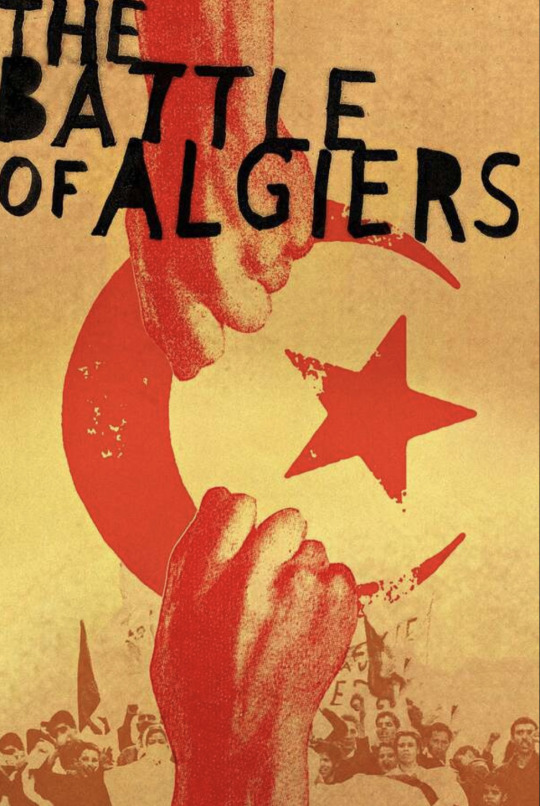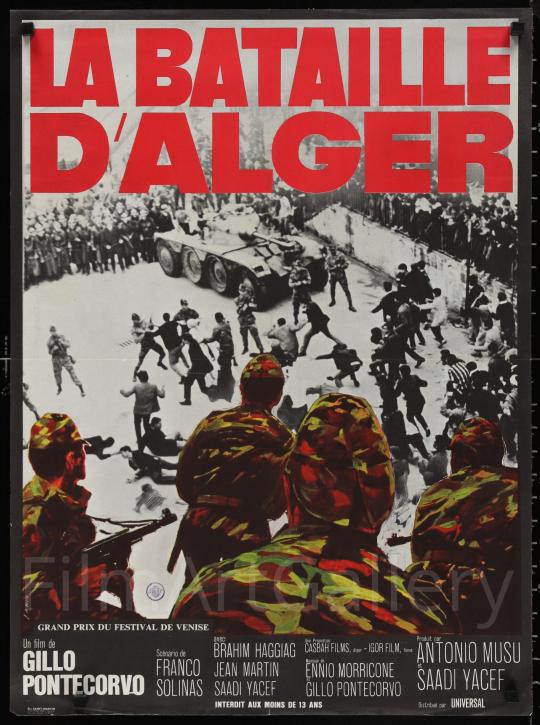#Gillo Pontecorvo
Explore tagged Tumblr posts
Text

[Note: This poll is a re-do of an older poll, as the original poll received less than 2,000 votes.]
#movies#polls#the battle of algiers#battle of algiers#60s movies#gillo pontecorvo#brahim hadjadj#yacef saâdi#fouzia el kader#jean martin#mohamed ben kassen#have you seen this movie poll#redone poll
60 notes
·
View notes
Text









Queimada (1969)
69 notes
·
View notes
Text

Gillo Pontecorvo, November 19, 1919 – October 12, 2006.
With Marlon Brando.
13 notes
·
View notes
Text


Kapo (1960)
19 notes
·
View notes
Text

I sat in an unmarked grove, lifeless fruits and dismembered blossoms mocked me, and I kissed ‘revolution.’ She was the dirt, the air, and the fire in my soles. “I want you to dig and dig until you find an explosion in yourself as if the sun’s time has come,” she whispered with curled lips against the floor of my neck that turned to fists. “Then, as your sweat marches toward a creek, hoping tears can offer a victory lap - dig even further….Only then will you have my love.”
THE BATTLE OF ALGIERS | Dir. Gillo Pontecorvo (‘66)
#film#filmmaking#cinema#movies#screenwriting#screenplay#directing#italian filmmaker#revolution#battle of algiers#luigi mangione#stay woke#gillo pontecorvo#martin scorsese#algeria#documentary#all eyes on palestine#french#1950s#activist#fashion#black and white#cinematv#dailyflicks#action#thriller
8 notes
·
View notes
Text
Glauber Rocha
8 notes
·
View notes
Text

Wikipedia link
Letterboxd link
#movies#polls#the battle of algiers#battle of algiers#60s movies#gillo pontecorvo#filmblr#letterboxd#watchlist poll#credit to haveyouseenthismovie-poll for insp and format
9 notes
·
View notes
Text

The Battle of Algiers (1966)
Algeria/Italy
Directed by Gillo Pontecorvo
Starring: Brahim Hadjadj, Jean Martin, Yacef Saadi
Tracing the struggle of the Algerian Front de Liberation Nationale to gain freedom from French colonial rule as seen through the eyes of Ali from his start as a petty thief to his rise to prominence in the organisation and capture by the French in 1957. The film traces the rebels’ struggle and the increasingly extreme measures taken by the French government to quell the revolt.




3 notes
·
View notes
Text
youtube
Another bit from Ennio Morricone's soundtrack for "The Battle of Algiers" (Gillo Pontecorvo).
#algeria#algiers#the battle of algiers#france#french army#gillo pontecorvo#ennio morricone#morricone#film music#soundtrack#soundtracks#film score#movie music#film composer#composer#composers#orchestra#music#musician#musicians#movie#movies#film#films#Youtube
2 notes
·
View notes
Text

Burn! (Gillo Pontecorvo, 1969)
6 notes
·
View notes
Text

#movies#polls#the battle of algiers#battle of algiers#60s movies#gillo pontecorvo#have you seen this movie poll
32 notes
·
View notes
Text
Coldharbour Lane, Brixton London, 2024.
London becomes a film strip as one walks down Coldharbour Lane, alongside the Brixton Ritzy.

#ColdharbourLane#Brixton#Ritzy#Cinema#BetteDavis#SidneyPoitier#London#BlackandWhite#iphoneography#iPhone13#Cities#gillo pontecorvo#Battle of Algiers#old hollywood#jean harlow#Clark Gable#old movies
3 notes
·
View notes
Text

Gillo Pontecorvo, November 19, 1919 – October 12, 2006.
With Marlon Brando.
12 notes
·
View notes
Photo

Kapo (Gillo Pontecorvo, 1964) Polish movie poster by Andrzej Onegin-Dabrowski
2 notes
·
View notes
Photo









La battaglia di Algeri, Gillo Pontecorvo, 1966
5 notes
·
View notes
Text

"ACTS OF VIOLENCE DON'T WIN WARS. NEITHER WARS, NOR REVOLUTIONS."
PIC INFO: Resolution at 3170x4255 -- Spotlight on am original French movie poster design for "The Battle of Algiers" (1966), controversial docudrama on the French-Algerian War from director Gillo Pontecorvo (film was produced in 1966 but banned in France until 1971).
"Acts of violence don't win wars. Neither wars, nor revolutions. Terrorism is useful as a start. But then, the people themselves must act. That's the rationale behind this strike: to mobilize all Algerians, to assess our strength. It's hard to start a revolution. Even harder to continue it. And hardest of all to win it. But, it's only afterwards, when we have won, that the true difficulties begin. In short, Ali, there's still much to do."
-- BEN M'HIDI to Ali la Pointe (screenplay by Franco Solinas)
Sources: https://filmartgallery.com/products/the-battle-of-algiers-4961 & https://m.imdb.com/title/tt0058946/quotes/?ref_=tt_trv_qu.
#The Battle of Algiers#Battle of Algiers#Sixties#World Cinema#Docudrama#World Film#Italian Cinema#War Films#War Movies#Movie Poster#Poster Art#French-Algerian#French-Algerian War#Foreign Films#Italian Neorealism#Gillo Pontecorvo#La battaglia di Algeri#Maʿrakat al-Jazāʾir#Algerian War for Independence#Cinema#Algerian War#60s Cinema#Poster Design#Neorealism#1960s#60s#Poster#Graphic Art#Italian Films#Italian Neorealist Cinema
2 notes
·
View notes